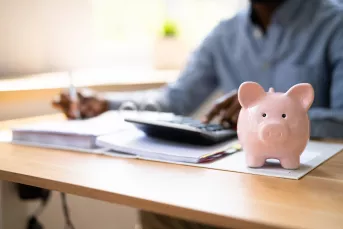
Should You Pay Off Debt or Save First?
Feeling stuck between paying off debt and building your savings? It’s a tough choice many of us face. On one hand, chipping away at your debt can feel like an uphill battle, especially when those balances never seem to budge. On the other, building a savings cushion or emergency fund can bring peace of mind — but delaying debt payments may mean more interest in the long run.
So, what should you prioritize? Is it better to pay off debt or put money into savings?
When it makes sense to pay off debt first
Paying off debt can feel like a fresh start, allowing you to build wealth and shift your focus toward saving.
Ideally, you should be able to save and pay debt at the same time. But there are situations in which your best bet is to focus on eliminating debt before you start saving money.
- Existing emergency fund. If you’ve already built up an emergency fund, congrats! Having a financial safety net in place for unexpected financial emergencies means you can prioritize debt payoff without worry.
- High-interest debt. Debts with high interest rates cost you more over time. Prioritizing these will save you money in the long run.
- Multiple debt accounts. If you’re juggling several debt accounts, especially revolving credit, paying them off can give your credit score a boost and simplify your financial life.
- High amount of debt. Recently made a big purchase, like a car or new furniture? Paying it off quickly should be a top priority.
- No room to save. If your monthly expenses and debt payments leave nothing for savings, it’s time to tackle your debt first.
- Stress and anxiety: If debt is keeping you up at night or causing constant worry, that’s a clear sign it’s time to focus on becoming debt-free!
Paying off debt can feel like a fresh start, allowing you to build wealth and shift your focus toward saving. Plus, the discipline you develop while paying down debt sets the foundation for healthier money habits. And let’s not forget — being debt-free feels amazing!
When it makes sense to save first
Saving money might sound intimidating, but it’s just making one intentional decision after another to achieve a goal.
Life has a way of throwing curveballs, and many of those curveballs come with hefty price tags.
According to a survey by Bankrate, emergencies and unexpected expenses are the reason why 43% of Americans carry a balance on their credit cards.
Another study by Empower revealed that 21% of Americans have no savings, and 37% wouldn’t be able to pay for an unexpected expense over $400.
If you don’t have enough savings, even a single emergency could derail your finances, forcing you to take on more debt or leaving you unable to cover your regular bills. If your savings wouldn’t cover an emergency expense of at least $1,000, it’s wise to focus on building your savings first.
Another situation where you can prioritize saving money is when you have low-interest (or no-interest) debt. Unlike high-interest debt, there’s not much pressure to pay off low-interest debt quickly since you aren’t paying a lot of interest over the life of the life of the debt.
Keep in mind, prioritizing savings doesn’t mean you stop paying down debt — it just means making minimum payments while directing extra cash to your savings. Once you’ve built a solid emergency fund, you can shift focus back to paying off debt.
Understanding your debt
To make the best decision about whether to pay off debt or save first, you’ll need a clear picture of your overall financial situation. This means assessing your savings, income, and the types of debt you’re carrying.
Your emergency fund
If you don’t have an emergency fund, your priority should be saving. Start by setting aside at least $1,000, which can cover unexpected expenses like car repairs or small medical bills before they turn into major financial setbacks. Long-term, aim to save enough to cover three to six months of living expenses, such as rent, utilities, and groceries. This will provide a cushion if your income is interrupted by reduced hours or job loss.
Your job situation
If your job isn’t secure, saving should be your top priority. Having a financial cushion ensures that if you lose your job, you’ll have funds available to cover essential expenses while you search for a new one. This safety net can make all the difference during uncertain times.
Your debts
On the other hand, if you’re carrying high-interest debt — such as pawn shop loans — it’s smart to focus on paying those off first. High-interest loans can quickly add up, costing you more over time. By eliminating these debts, you’ll save on interest and free up more money to put toward savings later.
Ways to pay off your debt
There are several effective ways to pay off debt, each with pros and cons. Deciding which method is best for you comes down to what motivates you: convenience, saving interest, or zero balances.
Choose a debt payoff strategy
Debt consolidation. Debt consolidation involves combining multiple debts into one loan, giving you the convenience of a single monthly payment. You might also save on interest compared to your original debts. However, qualifying for a debt consolidation loan can be challenging, especially if you have a high debt load, and you’ll need to go through the typical loan approval process.
Debt avalanche. If you’d rather skip the debt consolidation process, the debt avalanche is a popular strategy that focuses on paying off debts with the highest interest rates first, working your way down to the lowest. This method saves you the most on interest over time. The downside is it may take longer to see results early on, which can be discouraging if you’re eager to knock out balances quickly.
Debt snowball. My personal favorite, the debt snowball method, focuses on paying off the smallest debt first. Once that’s gone, you take the payment you were making on that debt and apply it to the next largest debt, and so on. The advantage? You get the satisfaction of seeing accounts hit zero faster, which can be super motivating. The drawback is you might end up paying more in interest over time, but for me, the sense of accomplishment makes it worth it!
Automate your debt reduction plan
Once you decide on a method, automating your debt payments simplifies debt management. Automated payments allow you to budget your paycheck and avoid penalties for missed or late payments.
➢RELATED: Can You Use a Line of Credit to Pay Off Debt?
How to save money in 2024
Saving money might sound intimidating, but it’s just making one intentional decision after another to achieve a goal. There’s still plenty of time in the year to start a savings plan!
Create a budget
A budget is simply a spending plan that helps you manage your income and expenses. By creating a budget (and sticking to it!), you’ll have a clearer path to reaching your savings goals.
Cut back on non-essential spending
Review your non-essential expenses and look for areas to cut back. This could mean canceling that unused gym membership, eating out less, or swapping daily coffee shop runs for homemade brews.
Track your expenses
Keep a record of your spending in categories like housing, utilities, groceries, and entertainment. Whether you use a spreadsheet or a simple notebook, tracking your expenses can reveal spending habits and help you stick to your budget.
➢RELATED: Get our FREE Budget Tracker
Set savings goals
Write down your long-term savings goals — like buying a house or retiring early — and keep them in sight as a reminder to stay motivated. Seeing your progress toward these goals can keep you on track.
Open a savings account
If you don’t have a savings account, open one that best meets your needs. Make sure your savings account deposits or transfers are easy to motivate you to save consistently each week or month.
Consider opening more than one savings account to hold money for specific goals. For example, I have one account for my “small emergency fund” and another for my three-to-six-month expenses fund.
Save for retirement and education
Once your emergency funds are in place, start saving for retirement by investing in an IRA or a 401(k), especially if your employer will match your contributions.
Likewise, education savings funds (such as a 529 plan) allow you to contribute tax-free (up to a limit) to your children's education.
Automate your savings
Set up automatic transfers from your paycheck to your savings account. This “set it and forget it” approach makes saving easier and more consistent. Aim to work up to saving 20% of your income.
What to do if you need money now
If you need money to cover expenses right away, a personal loan from Advance America might be able to help. Apply online or visit one of our convenient locations to discuss your options.
Notice: Information provided in this article is for informational purposes only. Consult your attorney or financial advisor about your financial circumstances.


